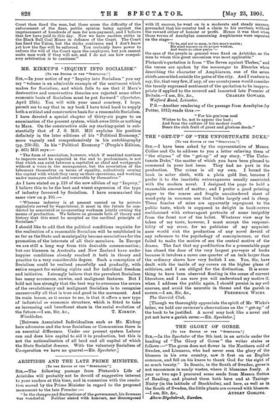MR. KIRKUP'S "INQUIRY INTO SOCIALISM."
LTO Tax EDITOR Or THE "SPECTATOR."]
SIR,—In your notice of my "Inquiry into Socialism" you say my " volume is an admirable example of the sentiment which
makes for Socialism, and which fails to see that if Marx's destructive and constructive theories are rejected some other economic basis of Socialism must be put forward" (Spectator,
April 25th). You will with your usual courtesy, I hope, permit me to say that in my book I have tried hard to supply both a critical and constructive basis for a reasonable Socialism.
I have devoted a special chapter of thirty-six pages to an examination of the present system, which owes little or nothing to Marx. On the constructive side my starting-point is sub- stantially that of J. S. Mill. Mill explains his position definitely in the later editions of his " Political Economy," more vaguely and comprehensively in his autobiography (pp. 230-33). In his " Political Economy " (People's Edition, p. 465) Mill says :— " The form of association, however, which if mankind continue to improve must be expected in the end to predominate, is not that which can exist between a capitalist as chief and workpeoplo without a voice in the management, but the association of the labourers themselves on terms of equality, collectively owning the capital with which they carry on their operations, and working under managers elected and removable by themselves."
As I have stated on p.118 of the new edition of my "Inquiry," I believe this to be the best and wisest expression of the type of industry favoured by Socialism. I have summarised the same view on p. 105 :— " Whereas industry is at present carried on by private capitalists served by wage-labour, it must in the future be con- ducted by associated or co-operating workmen jointly owning the means of production. We believe on grounds both of theory and history that this must be accepted as the cardinal principle of Socialism."
I should like to add that the political conditions requisite for the realisation of a reasonable Socialism will be established in so far as the State and municipality become associations for the
promotion of the interests of all their members. In Europe we are still a long way from this desirable consummation ; but our kinsmen in Australia and New Zealand have under happier conditions already reached it both in theory and practice to a very considerable degree. Such a conception of Socialism could be realised peacefully and gradually, with entire respect for existing rights and for individual freedom and initiative. I strongly believe that the prevalent Socialism has many erroneous, unwise, and malignant features. But I hold not less strongly that the best way to overcome the errors of the revolutionary and malignant Socialism is to recognise unreservedly all that is true and good in the movement. And its main lesson, as it seems to me, is that it offers a new type of industrial or economic structure, which is fitted to take an increasing and beneficent share in the social evolution of [Between Associated Individualism such as Mr. Kirkup here advocates and the true Socialism or Communism there is an essential difference. Under our present system Labour can and does hire capital to aid it in production, but this is
not the nationalisation of all land and all capital of which the State Socialist dreams. With the voluntary Socialism of co-operation we have no quarrel.—En. Spectator.]






































 Previous page
Previous page